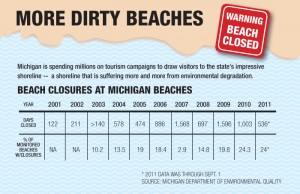Beach closures hit record; stormwater runoff blamed
Diana Farris took her family to Young State Park in Charlevoix in late July to try to escape a brutal heat wave that was baking much of the Midwest.
Her plan was to spend the hottest part of the day swimming in the lake with her husband and two daughters. Things changed a couple of days into their visit, though, when bacterial pollution forced health officials to close the popular beach near Boyne City.
Routine water sampling found high levels of E. coli, an indicator of fecal matter. The beach was closed for three days, forcing the Farrises to swim elsewhere.
 “We went there specifically to go swimming in the lake,” Diana Farris said. “We were disappointed … they said it was only the third time in 50 years that the beach had been closed.”
“We went there specifically to go swimming in the lake,” Diana Farris said. “We were disappointed … they said it was only the third time in 50 years that the beach had been closed.”
The source of human fecal matter in the water at Young State Park’s beach wasn’t identified. The most likely cause was a thunderstorm that flushed fecal matter out of storm drains and into Lake Charlevoix, said Shannon Briggs, a toxicologist for the Michigan Department of Environmental Quality who runs the state’s beach monitoring program.
Bacterial pollution has caused record numbers of beach closures in Michigan over the past two years, according to DEQ data.
In 2010 and again this summer, 24 percent of the roughly 400 beaches that the state monitors were closed for at least one day due to bacterial pollution. The percentage of Michigan beaches with at least one closure has more than doubled since 2003, according to state data.
State officials believe that most of the fecal matter polluting beaches comes from two sources: Storm drains and birds.
Storm drains discharge polluted stormwater, rain and snowmelt that can contain human fecal matter loaded with E. coli onto beaches; bird feces also contain E. coli.
 Briggs said she believes beach closures are increasing in Michigan because many cities have eliminated combined sewer pipes. That work has reduced discharges of raw sewage into Michigan waters by reducing the volume of rain and other stormwater entering sewage treatment facilities.
Briggs said she believes beach closures are increasing in Michigan because many cities have eliminated combined sewer pipes. That work has reduced discharges of raw sewage into Michigan waters by reducing the volume of rain and other stormwater entering sewage treatment facilities.
But there is a tradeoff: Separating combined sewer pipes means that more untreated stormwater reaches lakes and rivers. Studies in Wisconsin have found that storm drains are often contaminated with fecal matter.
(BRIDGE GALLERY: Beach troubles to the east and west.)
Briggs said communities need to do a better job of controlling stormwater runoff by installing rain gardens, constructing wetlands and using other so-called green infrastructure that filters pollutants out of water to reduce beach closures.
Briggs added, however, that water quality has improved at most Michigan beaches in recent years.
“Most of the beaches in Michigan have baseline levels of E. coli that are less than 50 (colonies of E. coli per 100 milliliters of water). That’s great,” Briggs said. “But when it rains, we see spikes in E. coli.”
Beaches are closed when E. coli levels surpass 300 colonies of E. coli per 100 milliliters of water.
Michigan’s beach closures are most common along Lake St. Clair and the St. Clair River, but the problem is widespread. Bacterial pollution has closed beaches on all four of the Great Lakes that lap Michigan's shores and in some of the state’s most scenic areas: the Upper Peninsula, Traverse City and beaches along the sparsely populated coast of Lake Huron.
Lingering bacterial pollution at Brimley State Park, located west of Sault Ste. Marie on the shores of Lake Superior, has closed the park’s beach for 26 days this summer, according to state data.
Bacterial pollution also has forced the beach at Sault Ste. Marie’s popular Sherman Park to be closed several days this summer.
Local residents are concerned about potential health effects and business owners are worried that the beach closures are hurting tourism, said Christine Daley, manager of environmental health for the Chippewa County Health Department.
“This problem overwhelms me at times because people think of the U.P. as being pristine and clean; it’s unfortunate,” Daley said. “The public is livid … people are really concerned.”
Daley has tracked some of the fecal matter polluting the beach at Brimley State Park to storm drains that carry rain and melting snow to the beach. But she said there are other sources that have yet to be identified.
Meanwhile, Brimley State Park has become a regular on the state’s list of closed beaches. (See the list at http://www.deq.state.mi.us/beach)
Daley said the stigma of polluted water probably scares away some potential visitors to the area.
“You go on the Web to look at beach closures and you say, ‘We’re not going to Brimley because they have a beach closure and that’s no fun,’” Daley said.
Daley and Briggs said beach closures should not deter people from visiting any area. They said there are usually plenty of other beaches nearby where people can swim without encountering high concentrations of E. coli, which can cause gastrointestinal ailments.
Rebecca Humphries, who was director of the Michigan Department of Natural Resources and Environment from 2006-2010, said she worries that the public doesn’t grasp the magnitude and seriousness of water pollution that forces health officials to close Michigan beaches.
“I think Michigan residents and our visitors are more focused on the risk of drowning in the lakes,” Humphries said. “But I don’t think anyone wants themselves or their kids to be exposed to these pathogens in the water.”
See what new members are saying about why they donated to Bridge Michigan:
- “In order for this information to be accurate and unbiased it must be underwritten by its readers, not by special interests.” - Larry S.
- “Not many other media sources report on the topics Bridge does.” - Susan B.
- “Your journalism is outstanding and rare these days.” - Mark S.
If you want to ensure the future of nonpartisan, nonprofit Michigan journalism, please become a member today. You, too, will be asked why you donated and maybe we'll feature your quote next time!

